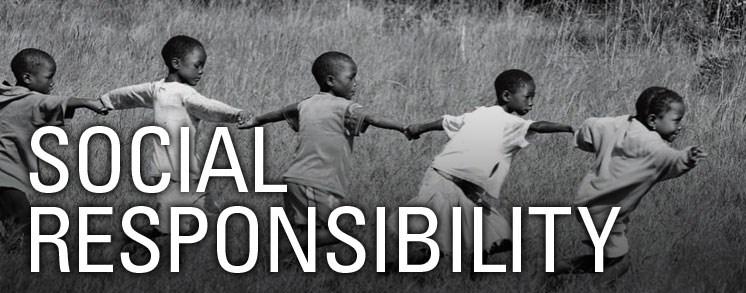
7 minute read
Fundraising, Corporate Social

RandeepDosanjh Entrepreneur, Microsoft Solution Provider (Senior BI / SharePoint)
Advertisement

Fundraising, Corporate Social
Responsibility and Helping Others ShareonLinkedIn ShareonFacebook ShareonGooglePlus ShareonTwitter For many years, even as young as 10 or 12 years old, I have been involved with helping raise funds for causes which help others in need or have been a volunteer hand in larger campaigns & organizations. I saw from the front line, thatthese funds go towards helping others on the front line helping others in need. Either with my mom and the women in the house with an advocacy of human freedoms and constitutional rights ofSouth Asian women to my dad's volunteering
work as the President of aNeighborhood House & other workin the community-my examples were at home.
This idea of "Fundraising, Social Responsibility and Helping Others" was something fostered into us as children. We saw the value of giving while empowering others. From empowering women to helping out in the community -it went even further when mom was the President of a Union Local in the 80s and decided that 2 weeks for maternity leave isn't going to "cut it" and to other women from different industries in BC who came together to get a mandatory 6 months, then 1 year, then the father of a child got time off too. Today, many of the people we have helped are celebrating their own light of success.
In recent years, the push for social responsibility and fundraising has become more a "resume item". People don't give and volunteer with their heart is as much, they give where they will get the most attention and recognition, even only attend where the crowd at the event is people they want to be associated withor where their friends tell them to go. An recognized set of traits to this kind of work is best seen in those who give without a lot of attention. After all, it is the results of the funds raised and the work done that we should be more concerned with. Speaking as a volunteer and a fundraiser, often we want to donate everywhere but tend to give most to who we resonate best with. Some people give to where their credit for giving will resonate best. In this situation, resources in other areas are left short because if credit is what the aim is, if there is no credit then, there is no funds raised from these people who choose it as a "resume item".
What is Fundraising?
Fundraisingis a significant way that non-profit organizations may obtain the money for their operations. These operations can involve a very broad array of concerns such as religious or philanthropic groups such as research organizations, public broadcasters, political campaigns and environmental issues.(www, en.wikipedia.org/wiki/Fundraising,2015)

What is Social Responsibility?

Socialresponsibilityis an ethical framework which suggests that an entity, be it an organization or individual, has an obligation to act for the benefit of society at large.Socialresponsibilityis a duty every individual has to perform so as to maintain a balance between the economy and the ecosystems. (www, http://en.wikipedia.org/wiki/Social_responsibility,2015) Those above were probably obvious and understandable without definitions,
However,
What does it mean to help people?
Unlike Fundraising and Social Responsibility, "helping people" has no clear definition, when Googled -there is mostly links to steps one would take to help others in need, in trouble or with somethings which require help -even rules to behumane.
The point this article is attempting to make is that humans whom we are, can fund-raise and attend to social responsibility, even take credit or be given it, have word of our fundraising and social responsibility reach the highest ranksof society and sit as rewards from the highest powers of government and private institutions but really, unless people know what to do with the money and how many, how effectively these raised funds are in "helping people" or how effective they are at restoring and feeding "humane efforts" will be the judge of how effective the fundraising and social responsibility are.
I realized sometime over the years that people stopped giving credit to front line workers and almost celebrity-drove the fundraising portion to a point where we forgot what the real problem was or is. That is when it came to me, that many of those who fund-raise and volunteer are actually doing the work for the credit NOT to help others or so it appeared to me, this was not giving people an idea of how effective those funds have been. I run a business, I have run many businesses from startups to being a consultant to Fortune500 firms and at the end of the day, the value of what was done to make money was the kind of principal which is what we get credit for. It's not what you have that counts, it's what you did to get it -no?
In the picture above, which went viral apparently of the US Armed Forces Soldier giving food to the homeless, we might not have ever seen if that had not be the case. I bet most people do not know the names of most of the people helping. But come accreditation time, I bet someone in the higher echelons of society and social stature will walk away with an award and be valued as the "real hero" without knowing a thing about how it helped the people in line and what that slice of pizza was doing to add to their struggle to get out of poverty or trouble that day.

In fact there is a popular lifestyle article writer, she has a science undergrad degree and writes papers of restaurants and food with travel and other "lifestyle" things. Why did anyone care what a science undergraduate who has had the privilege of being able to travel be interested in her, what she eats or even acceptingthe articles she wrote as credible enough to be in MontecristoMagazine or the Vancouver Sun and more? It is the kind of people who empowered her into this line of work, dis-empowered someone or many more much more qualified people perhaps.
In fact of the last point made, it wouldn't surprise me as one of the Top Reasons as to why why we have non-profit organizations to help the less fortunate. Because the privileged give back with money and with helping the privileged move through the ranks of society, the caring give
back with their hands and needy may never be able to give back, let alone write articles in Montecristo Magazine or even be able to afford to buy it to read for themselves.
This kind of article writer or someone with a popular "social status" ranking might show up, even take credit for promoting or give credit to people who are in need of promotion for their ranks in social circles or for their next job. To take credit for the work done by the people on the front lines of these amazing non-profit organizations and institutions which put together campaigns to help other people, are people working in silence from the heart. It defuses the whole reason when you get a news story in the lifestyle section of some big non profit dinner party by celebrating who attended rather than see the "numbers" and how the money has helped year after year.
This isthe sad truth of fundraising and non-profit "hero`s" when what we should be celebrating and getting news of is what that money did year around and how effective it really is. Might make more people want to give more if those numbers were made without having to request them or hear them from someone trying to sell you a ticket -or worse, to tell you how much money was raised, who was there and why you never get how the money helped. Oh and you probably didn't get a ticket either because after someone soldyou a ticket they didn't tell you that you're not someone they want to sell or give a ticket to because of your rank in society. That must suck. At least you get a tax return, maybe?
Author: Randeep Dosanjh
ARightsReservedwithanyreferencetothisarticleinwholeorinpartwiththeconsentof theAuthor: RandeepDosanjh

